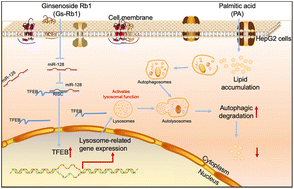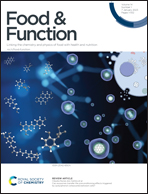Ginsenoside Rb1 induces autophagic lipid degradation via miR-128 targeting TFEB
Abstract
In recent years, the effect of lipid metabolism on health has attracted more and more attention. Ginseng is a traditional Chinese herbal medicine in China and is widely used as food in Asia. Ginsenoside Rb1 (Gs-Rb1) is the most abundant ingredient in ginsenoside, which has a variety of biological activities. In this study, we found that Gs-Rb1 can reduce lipid accumulation in mice and HepG2 cells induced by a high-fat diet (HFD) and palmitic acid (PA). At the same time, we also found that Gs-Rb1 could stimulate the autophagic flux of HFD-fed mice and PA-treated HepG2 cells, and it is further verified by adding the autophagy activator rapamycin (Rapa) and autophagy inhibitor chloroquine (CQ). Furthermore, we found that Gs-Rb1 promoted the nucleus translocation of the transcription factor EB (TFEB) and the target role of miR-128, thus stimulating autophagic flux. Therefore, our results showed that Gs-Rb1 enhanced the transcription of TFEB and its downstream lysosome-related genes by inhibiting miR-128, improved the degradation ability of lysosomes to autophagosomes, and then promoted autophagic lipid degradation.



 Please wait while we load your content...
Please wait while we load your content...